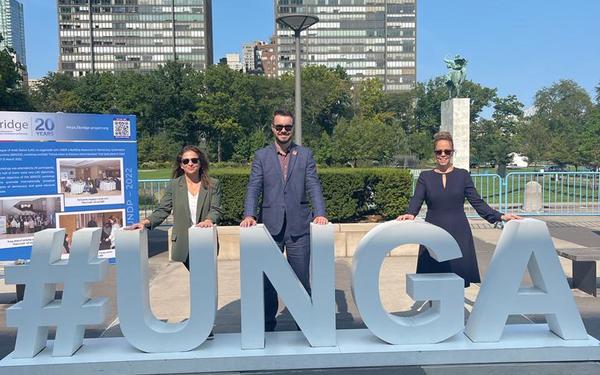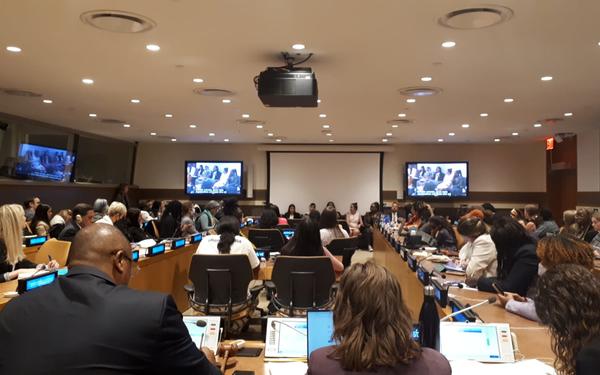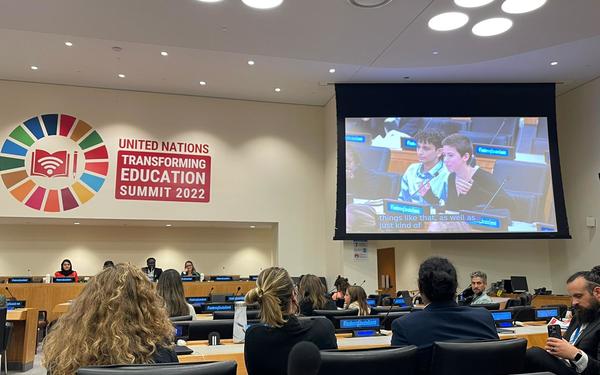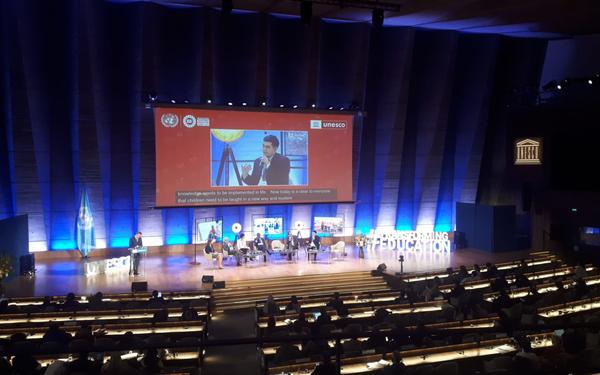Transforming Education Summit: Collaboration for more effective action
Over the weekend, our Managing Director Jane Mann, Lead Education Analyst Christopher Martin and Head of Partnerships Anna Kingsley joined delegates from around the world for the Transforming Education Summit at the UN Headquarters in New York.

We heard world leaders make national and international commitments to transform education. We all discussed changing our education systems for the better. Now, the UN will add a vision statement on transforming education to the preparations for the Summit of the Future - expected in September 2023 to forge a new global consensus on what our future should look like, and how to get there.
It’s been great to meet with partners – old and new – and explore how we can support them to improve quality education in the critical months and years ahead.
The journey to the summit took almost a year, and involved collaboration across organisations and borders.

Preparing for the Transforming Education Summit
At the end of 2021, the UN Secretary-General announced the Transforming Education Summit. The plan: to elevate education to the top of the global political agenda, mobilising the resources and solutions to recover learning losses and transform education for the future.
On the International Day of Education in January 2022, our Head of Education Content & Solutions Dominique Slade reflected on UNESCO’s rallying cry to forge a new social contract for education. She echoed the call for a society-wide commitment to include everyone in public discussions to strengthen education as a common good.
So, the open call for input to the Transforming Education Summit – through a series of action tracks and national and regional consultations – was very welcome. In April, we spoke to UNESCO about interweaving discussion of effective education solutions with the commitments around the Summit. They encouraged us to contribute to the action tracks too.
The thematic action tracks have been set up to highlight policy interventions and approaches that work in a specific area of education that needs attention. At Cambridge, we directly contributed to:
- Action track two: Learning and skills for life, work, and sustainable development
- Action track three: Teachers, teaching, and the teaching profession

Learning and skills for life, work, and sustainable development
Dominique worked on action track two: “I focused on this discussion both because of my experience working with governments to find education solutions which meet the needs of their future economy and society, and my personal dedication to how we prepare people for what’s over the horizon. Before my role in Cambridge Partnership for Education, I led our TVET work across Cambridge for five years.
“In reviewing action track two, I looked at three things: clarity, breadth and examples of good practice. I recommended some additional areas to consider in this track, like career guidance, and that stronger emphasis was placed on entrepreneurship. Career guidance is an important link between education and work, raising awareness of the wide-range of jobs and possibilities from a young age – including in the digital and green sectors – is essential. In the UK, the 8 Gatsby benchmarks of Good Career Guidance offer a standard framework for schools and colleges. Further examples I raised were embedding sustainability in the school environment through Eco Schools and building robust lifelong learning policies in sustainability.”
Teachers, teaching, and the teaching profession
Our Head of Professional Development Solutions Marc Neesam gave feedback on action track three around teaching. In addition to attending an online consultation and offering written feedback, Marc met with the international taskforce leading this track: “Evidence has shown for some time that quality of teaching can have the single biggest impact on a child’s education. The pandemic sparked widespread international recognition of the vital role of the teacher.
“Conversation in this action track is accordingly rich – and the discussion paper has a plurality of views. A great deal of the content aligns closely with our approach to teaching and teacher development at Cambridge. I welcomed the focus on aligning initial teacher education with continuous professional development in particular. It’s important we support governments to implement sustainable education solutions which continue to gain traction and results long after our involvement in the programme.
This track has already sparked a movement – the #TeachersTransform campaign. The campaign’s aims to support teachers as change agents through better professional development, concrete positive examples and targeted support are central to the work we do at Cambridge.”

The Pre-Summit in Paris
In June, we joined the Transforming Education Pre-Summit in Paris. It confirmed a seismic shift in the urgency of the response to the education crisis, and the increased recognition of evidence-based approaches. A few countries had completed their national consultations – but many were in the thick of discussion. We left France with the drumbeat for change in our ears.
Collaboration and alignment
Dominique: “A lot of the content of the conversation around the Transforming Education Summit might not be ‘new’ – there’s long been research on the impact of education disruption, learning loss and viable solutions – but the prominence and scale of the discussion has dramatically changed. Since the spread of Covid-19, ‘learning loss’ has become a household phrase for the first time. The pandemic has revealed, and escalated, the inequalities in education. It has created a new urgency to resolve them.
“Covid-19 continues to cause disruption, and after two years we are entering a new era. We also know there will be further disruptions to education, as so tragically we have seen in Pakistan this month and in countries continuing to experience devastating conflicts like Ukraine and Yemen.”
The Brookings and Ministry of Education of Sierra Leone policy brief on transforming education systems published in June spoke of education in our ‘new normal’ and drew to the forefront research on the importance of aligning different elements of an education system to one another – as we highlight in the Cambridge Approach to Improving Education.
Around the summit, the Global Partnership for Education has called on the international community to “step up our support to turn [education] commitments into action.” They outline “a sharpened approach to help countries identify and unblock the critical obstacles in their education systems and align partners behind priority reforms, allowing them to achieve results on a large scale.”
So, we’ve been listening a lot over the past few days – and will continue to listen carefully. To government leaders, to education experts, to international development organisations, to teachers, and to young people. We’re ready to respond and embrace partnerships to achieve more together. With the ambitious commitments the world is expecting – and needs, there’s no time to lose.
The big ideas and takeaways from the Summit
Find out more: Our Managing Director Jane Mann will be joining a session with Devex, UNICEF and Education Cannot Wait to share the big ideas and key takeaways from the Summit on Thursday 22 September at 9.05pm BST (4.05pm ET).
